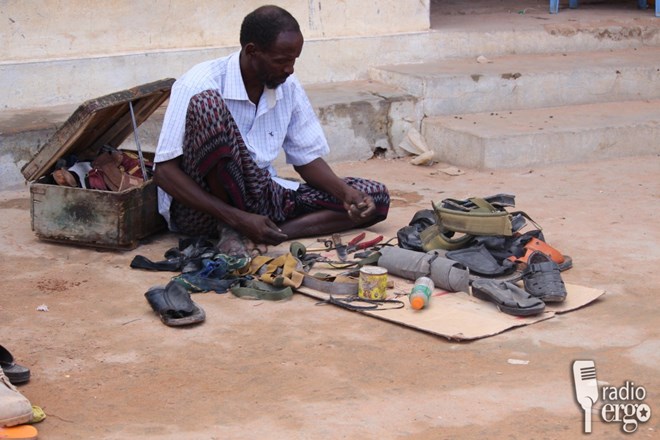
Tuesday July 3, 2018

Former pastoralist Ibrahim Ismail Ige, 39, lives in the Somaliland capital Hargeisa, and earns a living as a grave digger.
It is a far cry from the life he used to lead, when he had a large herd of 60 camels and 200 goats in the rural areas. His whole family depended on livestock for a living.
But the harsh drought that hit Somalia in 2016 turned his village, Dobo-bariyale, on the southern border with Ethiopia, into a desert. All the animals died and the family moved to Nasa-Hablood 1 IDP camp, east of Hargeisa, where they live now.
“I never thought my income would be tied to the death of people,” Ibrahim told Radio Ergo.
Ibrahim learnt all about grave digging in the early part of 2017. Now it takes him three days to complete a grave and he sells the space for $40. It is a decent amount to support his 12-member family. Still, Ibrahim is sad that he has not been able to continue the proud pastoralist tradition that he inherited along with his livestock from his father.
“If I got my camels back I would not choose the city over the rural lifestyle. Keeping livestock is prestigious and a respectable man’s job. I would go back to the previous life any day, I was leading a very good life,” Ibrahim said.
Drought has brought to huge numbers of Somali pastoralists unemployment, food scarcity, displacement, and the stress of getting accustomed to a new life in the urban areas. Many have had to accept that they can no longer build their lives around livestock.
Abdi Haashi Keynaan, 65, a former pastoralist and father of 20 children from his four wives, owned 700 goats in Galgadud region of central Somalia. His entire herd was wiped out in the drought.
Abdi’s family migrated to Adado town in 2016, and settled in Karama IDP camp. He started repairing shoes, earning $2-3 a day, which provided an important lifeline for his large family. They cook one meal to share together when they all come back home in the evening.
Despite working every hour he can, Abdi cannot make enough from shoe repairs to support his family. Sixteen of his children are of school age but do not go to school as he cannot pay the fees.
Abdi said he was able to provide enough for his children before and that he would love to go back to the rural lifestyle if he could get some more livestock. He enjoyed his life much better then.
Across Somalia, from north to south, destitute former herders have been displaced from the rural areas and turned to new trades or casual jobs. Abdi Deero Muhumed, 58, is working as a watchman at Al-Shifa Hospital in Bardera, Gedo region. He earns $100 a month that takes care of his family living in Habaal-Cadey camp. He lost his 200 goats and 50 camels in Daar village, 30 km north of Bardera, after five years of drought.
The odd jobs that pastoralists have picked up have been a relief for their families. But many are a burden to relatives, who have let them move in to share their homes.
Abdisamad Mohamed Abdullahi, a professor of social sciences at the University of Hargeisa, sees the exodus of former herders to the urban areas as very damaging to the country’s economically important livestock sector.
He said it is vital that governmental authorities take strong measures to mitigate against future droughts, by planning for alternative water supplies including constructing water catchments and wells. This would enable pastoralists to move their livestock during drought and preserve their herds.